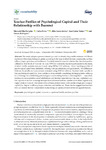Mostrar o rexistro simple do ítem
Teacher Profiles of Psychological Capital and Their Relationship with Burnout
| dc.contributor.author | Rodríguez Martínez, Susana | |
| dc.contributor.author | Ferradás, María del Mar | |
| dc.contributor.author | Freire, Carlos | |
| dc.contributor.author | García-Bértoa, Alba | |
| dc.contributor.author | Núñez, José Carlos | |
| dc.contributor.author | Rodríguez, Susana | |
| dc.date.accessioned | 2024-02-09T09:33:43Z | |
| dc.date.available | 2024-02-09T09:33:43Z | |
| dc.date.issued | 2019-09-18 | |
| dc.identifier.citation | Ferradás, M. M., Freire, C., García-Bértoa, A., Núñez, J. C., & Rodríguez, S. (2019). Teacher profiles of psychological capital and their relationship with burnout. Sustainability, 11(18), 5096. doi: 10.3390/su11185096 | es_ES |
| dc.identifier.issn | 2071-1050 | |
| dc.identifier.uri | http://hdl.handle.net/2183/35548 | |
| dc.description.abstract | [Abstract] This study adopts a person-centered approach to identify the possible existence of different teacher profiles of psychological capital, according to the way in which its four components combine (efficacy, hope, optimism, and resilience). The study aimed to examine whether the identified profiles differed in their levels of burnout. In total, 1379 non-university teachers participated in the study. A latent profile analysis was performed using MPlus 7.11 software. Seven teaching profiles of psychological capital were identified, differing both quantitatively and qualitatively. The differences between the profiles in burnout were estimated using SPSS 26 software. Teachers with a profile of low psychological capital (i.e., low confidence of successfully completing challenging tasks—efficacy; lack of energy for establishing personal goals and working towards achieving them —hope; little tendency to make positive causal attributions and develop expectations of success—optimism; and low capacity to recover or emerge stronger from adverse situations—resilience) exhibited significantly higher levels of burnout. The lowest levels of burnout were found in the profile of high psychological capital (i.e., higher in efficacy, hope, optimism, and resilience). These results suggest that teachers who can muster the four components of psychological capital are more protected against burnout. | es_ES |
| dc.description.sponsorship | Principado de Asturias; FC GRUPIN-IDI/2018/000199 | es_ES |
| dc.description.sponsorship | This research received external funding of Government of the Principality of Asturias, Spain. European Regional Development Fund (Research Groups Program FC-GRUPIN-IDI/2018/000199). | es_ES |
| dc.language.iso | eng | es_ES |
| dc.publisher | MDPI | es_ES |
| dc.relation.uri | https://doi.org/10.3390/su11185096 | es_ES |
| dc.rights | Atribución 4.0 Internacional | es_ES |
| dc.rights.uri | https://creativecommons.org/licenses/by/4.0/deed.es | * |
| dc.subject | Psychological capital | es_ES |
| dc.subject | Burnout | es_ES |
| dc.subject | Occupational health | es_ES |
| dc.subject | Teachers | es_ES |
| dc.subject | Profiles | es_ES |
| dc.title | Teacher Profiles of Psychological Capital and Their Relationship with Burnout | es_ES |
| dc.type | info:eu-repo/semantics/article | es_ES |
| dc.rights.access | info:eu-repo/semantics/openAccess | es_ES |
| UDC.journalTitle | Sustainability | es_ES |
| UDC.volume | 11 | es_ES |
| UDC.issue | 5096 | es_ES |
Ficheiros no ítem
Este ítem aparece na(s) seguinte(s) colección(s)
-
GI-GIPED - Artigos [54]






